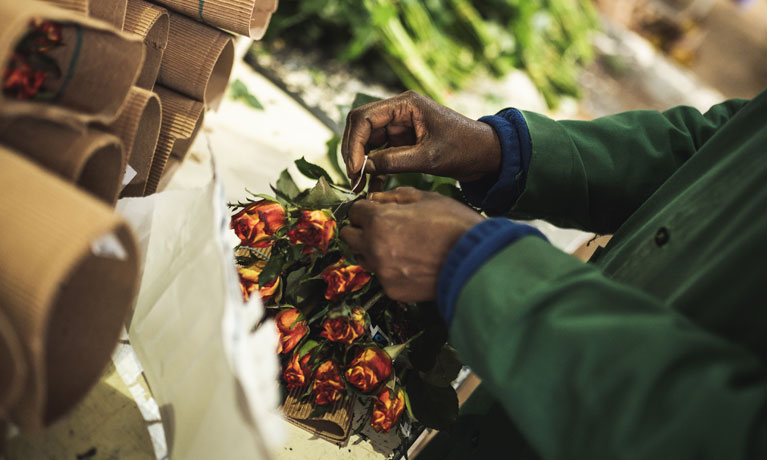Search
Behind the bouquet: building resilience in the flower supply chains

Image: Christop Köstlin for Fairtrade Germany
Thursday 11 February 2021
Press contact
A team of researchers from Coventry University’s Centre for Business in Society (CBiS) are providing research insights for a project supporting flower industry workers in Kenya who have been affected by the coronavirus crisis.
With St Valentine’s Day just a matter of days away and the supermarkets stocked with plush animals and fresh flowers, it’s easy to forget that the cut-flower industry was hit hard in the early stages of the pandemic. National lockdowns restricted social gatherings including weddings and funerals, causing flower sales to plummet and forcing many factories and farms worldwide to temporarily close.
However, after the initial COVID-19 panic faded and the public grew accustomed to the ‘new normal’ consumer demand for cut-flowers quickly recovered, leaving retailers with the challenge of supply, and producers with the challenge of providing safety and security for their workers.
Fairtrade Africa estimates over 90% of cut flower workers have been affected by the crisis, with issues including food insecurity, lack of personal protective equipment, poor access to hygiene facilities and job insecurity. These issues are being exacerbated by low or no wages, and non-existent savings.
Coventry University’s researchers are collaborating with the Fairtrade Foundation, the Food Network for Ethical Trade (FNET), MM Flowers, Partner Africa, Women Working Worldwide and UK retail partners (Co-op, Marks and Spencer and Tesco), to support the immediate needs of 6,000 workers and farmers in Africa, whilst also working to build resilience across the flower supply chain.
The partners will achieve this by:
- providing health protection and nutrition support to workers on both Fairtrade and non-Fairtrade farms;
- distributing health packages to workers and families at farms with the greatest needs: which include masks, soap, hand sanitiser and paracetamol;
- piloting nutrition gardens on more than four farms;
- introducing kitchen gardens so that workers can have reliable access to food for themselves and their families;
- expanding research into alternative ways that flower workers can earn an income, giving seed funding and support to workers;
- providing technical support so that farms can run projects aimed at diversifying their crops, so that they’re better able to withstand the effects of climate change and shocks to the market (as in the case of Covid-19);
- training workers on the importance of gender equality in relation to the impacts of Covid-19, so they are more aware of and better able to address issues relating to gender;
- running awareness raising campaigns to spread key health information to communities, through radio, SMS, and posters, which will reach up to 150,000 people.
Behind every bouquet in the supermarkets this Valentine’s Day is a story of the workers whose livelihoods depend on an industry that has experienced considerable disruption as a result of the coronavirus pandemic. This project has played an important role in supporting a number of farms and worker communities in Kenya.
Communication between firms in the supply chain has been critical for keeping trade going, which is essential for maintaining the fabric of the global economy on which we all depend. Those with good pre-existing relationships have been better placed to keep trade moving. Fairtrade and other well certified producers, who place an emphasis on their relationships and communication with stakeholders, have proven more resilient in times of uncertainty than producers who do not.
Dr David Bek, Reader in Sustainable Economics and Co-Lead of Cluster on Sustainable Production and Consumption at CBiS
Additional research from the Centre for Business in Society is showing that small-scale UK flower growers have found new opportunities in some local and regional markets, as retailers have homed in on the benefits of short supply chains. Dr David Bek believes that the 'local/seasonal' flower niche may well become more of a trend in the coming years.
Find out more about the project creating resilience and sustainability in supply chains.




